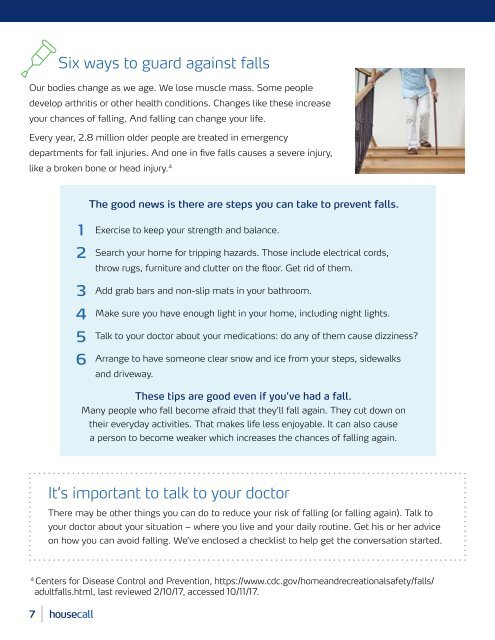CTC17115 Winter Housecall 2018 2_9_18 alt2(1)
You also want an ePaper? Increase the reach of your titles
YUMPU automatically turns print PDFs into web optimized ePapers that Google loves.
Six ways to guard against falls<br />
Our bodies change as we age. We lose muscle mass. Some people<br />
develop arthritis or other health conditions. Changes like these increase<br />
your chances of falling. And falling can change your life.<br />
Every year, 2.8 million older people are treated in emergency<br />
departments for fall injuries. And one in five falls causes a severe injury,<br />
like a broken bone or head injury. 4<br />
1<br />
2<br />
3<br />
4<br />
5<br />
6<br />
The good news is there are steps you can take to prevent falls.<br />
Exercise to keep your strength and balance.<br />
Search your home for tripping hazards. Those include electrical cords,<br />
throw rugs, furniture and clutter on the floor. Get rid of them.<br />
Add grab bars and non-slip mats in your bathroom.<br />
Make sure you have enough light in your home, including night lights.<br />
Talk to your doctor about your medications: do any of them cause dizziness?<br />
Arrange to have someone clear snow and ice from your steps, sidewalks<br />
and driveway.<br />
These tips are good even if you’ve had a fall.<br />
Many people who fall become afraid that they’ll fall again. They cut down on<br />
their everyday activities. That makes life less enjoyable. It can also cause<br />
a person to become weaker which increases the chances of falling again.<br />
It’s important to talk to your doctor<br />
There may be other things you can do to reduce your risk of falling (or falling again). Talk to<br />
your doctor about your situation – where you live and your daily routine. Get his or her advice<br />
on how you can avoid falling. We’ve enclosed a checklist to help get the conversation started.<br />
4<br />
Centers for Disease Control and Prevention, https://www.cdc.gov/homeandrecreationalsafety/falls/<br />
adultfalls.html, last reviewed 2/10/17, accessed 10/11/17.<br />
Bone health for women<br />
Osteoporosis, or thinning of the bones, is more<br />
common among women, and it’s not something<br />
you can feel. Unfortunately, the first sign is often<br />
a broken bone. That’s why it’s so important to<br />
get your bone mineral density (BMD) screening<br />
as often as your doctor recommends it, especially<br />
if you break a bone. A BMD test is quick (it often<br />
takes less than 15 minutes) and painless.<br />
Colonoscopy: when<br />
costs may apply<br />
Colorectal cancer is preventable in many cases<br />
through regular screenings and highly curable<br />
when found early. That’s why your plan covers<br />
a screening colonoscopy at 100 percent – it’s<br />
considered preventive care.* Your primary care<br />
provider (PCP) will recommend how often you<br />
need a screening colonoscopy.<br />
There are other times when your doctor wants<br />
you to have a colonoscopy, and you will be<br />
responsible for some of the cost. Some examples:<br />
you are having health problems like stomach<br />
pain, constipation, diarrhea or blood in your stool.<br />
If your doctor orders follow-up lab work from your<br />
colonoscopy, there may be a cost to you, too.<br />
*If a screening colonoscopy reveals a problem,<br />
and a doctor performs a procedure to address it<br />
(such as polyp removal), the outpatient surgery/<br />
services cost-share will apply.<br />
<strong>Winter</strong> <strong>20<strong>18</strong></strong><br />
Five ways to save<br />
on health care costs<br />
Health care costs can add up quickly, but there<br />
are ways to stretch your dollar without sacrificing<br />
your well-being.<br />
Get your preventive care<br />
Your doctor wants to help you avoid problems<br />
that could cost you money – not to mention,<br />
harm your health. Take advantage of the<br />
screenings that are included at no cost with<br />
your plan.<br />
Follow your doctor’s orders<br />
Take your medicine as directed and get those<br />
important tests. If you don’t, you may end up<br />
back in the doctor’s office or, worse, the hospital.<br />
Use preferred pharmacies<br />
Our many preferred retail pharmacies<br />
include Walgreens, Rite Aid, Stop & Shop<br />
and ShopRite.*<br />
Get in shape<br />
Regular exercise can reduce your risk of<br />
developing certain diseases. And a healthier<br />
you may mean fewer doctor visits and fewer<br />
medicines to pay for. SilverSneakers ® , included<br />
with most ConnectiCare Medicare Advantage<br />
plans, gives members unlimited access to<br />
13,000 gyms nationwide. Learn more at<br />
silversneakers.com.<br />
Use ambulatory surgery centers<br />
If you need out-patient surgery, ask your<br />
doctor if the procedure can be done at an<br />
ambulatory surgery center instead of a hospital.<br />
*This only applies to individual Medicare<br />
Advantage plans with Part D (pharmacy)<br />
coverage.<br />
7<br />
housecall housecall 8


